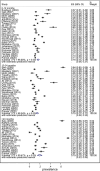Postnatal Depression Beyond 12 Months: A Systematic Review and Meta-Analysis
- PMID: 40055815
- PMCID: PMC11889294
- DOI: 10.1111/inm.70018
Postnatal Depression Beyond 12 Months: A Systematic Review and Meta-Analysis
Abstract
Traditionally, postnatal depression (PND) has been considered as depression in the first year after giving birth, although it has been argued that the 12-month cut-off may be somewhat arbitrary. Specialist perinatal mental health services in England have recently been extended to include women in their second year postpartum; however, there is no good estimate for the prevalence of PND beyond the first year. This review aimed to obtain the best estimate of the prevalence of PND in the second postpartum year. Eligible studies were those that assessed PND and provided a point prevalence using a validated screening tool or clinical diagnosis at least once beyond the first 12 months in women over the age of 18 years in any country. Studies were excluded if they only included women who were already depressed or had elevated depression scores at baseline. PubMed, Embase, Web of Science, CINAHL and PsychINFO were searched in January 2021 (and updated in February 2024) for studies that included the prevalence of PND beyond the first 12 postnatal months. Study quality was assessed using Cochrane's ROBINS-I and Risk of Bias 2 tools. Prevalence data were combined in meta-analysis using prediction intervals (PIs). A total of 6340 papers were found, and of these, 32 studies including 57210 participants across 18 countries met the inclusion criteria and were meta-analysed. The prevalence of PND in the second year (13-24 months) was 15% (95% confidence interval [CI] 12%, 17%; 95% PI 4%, 30%) and similar to that in the first year, 16% (95% CI 14%, 19%; 95% PI 6%, 31%). Despite considerable heterogeneity, common in meta-analysis of prevalence studies, findings show that a similar proportion of women experience PND in the second year after birth.
Keywords: postnatal care; postnatal depression; prevalence; systematic review.
© 2025 The Author(s). International Journal of Mental Health Nursing published by John Wiley & Sons Australia, Ltd.
Conflict of interest statement
All authors have completed the
Figures
Similar articles
-
Group cognitive behavioural therapy for postnatal depression: a systematic review of clinical effectiveness, cost-effectiveness and value of information analyses.Health Technol Assess. 2010 Sep;14(44):1-107, iii-iv. doi: 10.3310/hta14440. Health Technol Assess. 2010. PMID: 20863477
-
Breastfeeding interventions for preventing postpartum depression.Cochrane Database Syst Rev. 2025 Feb 18;2(2):CD014833. doi: 10.1002/14651858.CD014833.pub2. Cochrane Database Syst Rev. 2025. PMID: 39963955
-
Debriefing interventions for the prevention of psychological trauma in women following childbirth.Cochrane Database Syst Rev. 2015 Apr 10;2015(4):CD007194. doi: 10.1002/14651858.CD007194.pub2. Cochrane Database Syst Rev. 2015. PMID: 25858181 Free PMC article.
-
Telephone support for women during pregnancy and the first six weeks postpartum.Cochrane Database Syst Rev. 2013 Jul 18;2013(7):CD009338. doi: 10.1002/14651858.CD009338.pub2. Cochrane Database Syst Rev. 2013. PMID: 23881662 Free PMC article.
-
Home treatment for mental health problems: a systematic review.Health Technol Assess. 2001;5(15):1-139. doi: 10.3310/hta5150. Health Technol Assess. 2001. PMID: 11532236
References
-
- Agnafors, S. , Sydsjö G., Dekeyser L., and Svedin C. G.. 2013. “Symptoms of Depression Postpartum and 12 Years Later‐Associations to Child Mental Health at 12 Years of Age.” Maternal and Child Health Journal 17: 405–414. - PubMed
-
- American College of Obstetrics and Gynaecology . 2023. “Screening and Diagnosis of Mental Health Conditions During Pregnancy and Postpartum: ACOG Clinical Practice Guideline No. 4.” Obstetrics and Gynecology 141: 1232–1261. - PubMed
-
- Bahk, J. , Yun S.‐C., Kim Y.‐M., and Khang Y. H.. 2015. “Changes in the Relationship Between Socioeconomic Position and Maternal Depressive Symptoms: Results From the Panel Study on Korean Children (PSKC).” Maternal and Child Health Journal 19: 2057–2065. - PubMed
Publication types
MeSH terms
Grants and funding
LinkOut - more resources
Full Text Sources
Medical
Research Materials
Miscellaneous



